- Home
- Paolo Bacigalupi
The Gambler Page 2
The Gambler Read online
Page 2
My father and the policeman both sat and smoked, studying the paper silently. Finally, the captain asked, “Will you stop?”
My father drew on his cigarette and let the smoke out slowly as he studied the whisper sheet between them. The captain said, “We all respect what you have done for the Lao kingdom. I myself have family who would have starved if not for your work in the villages.” He leaned forward. “If you promise to stop writing these whispers and complaints, everything can be forgotten. Everything.”
Still, my father didn’t say anything. He finished his cigarette. Stubbed it out. “It would be difficult to make that sort of promise,” he said.
The captain was surprised. “You have friends who have spoken on your behalf. Perhaps you would reconsider. For their sake.”
My father made a little shrug. The captain spread the rumpled whisper sheet, flattening it out more completely. Read it over. “These sheets do nothing,” he said. “Khamsing’s dynasty will not collapse because you print a few complaints. Most of these are torn down before anyone reads them. They do nothing. They are pointless.” He was almost begging. He looked over and saw me watching at the door. “Give this up. For your family, if not your friends.”
I would like to say that my father said something grand. Something honorable about speaking against tyranny. Perhaps invoked one of his idols. Aung Sung Kyi or Sakharov, or Mr. Henry David and his penchant for polite protest. But he didn’t say anything. He just sat with his hands on his knees, looking down at the torn whisper sheet. I think now that he must have been very afraid. Words always came easily to him, before. Instead, all he did was repeat himself. “It would be difficult.”
The captain waited. When it became apparent that my father had nothing else to say, he put down his coffee cup and motioned for his men to come inside. They were all very polite. I think the captain even apologized to my mother as they led him out the door.
* * *
We are into day three of the Double DP bonanza, and the green sun glows brightly over all of us, bathing us in its soothing, profitable glow. I am working on my newest story with my Frontal Lobe ear buds in, shutting out everything except the work at hand. It is always a little difficult to write in one’s third language, but I have my favorite singer and fellow countryperson Kulaap whispering in my ear that “Love is a Bird,” and the work is going well. With Kulaap singing to me in our childhood language, I feel very much at home.
A tap on my shoulder interrupts me. I pull out my ear buds and look around. Janice, standing over me. “Ong, I need to talk to you.” She motions me to follow.
In her office, she closes the door behind me and goes to her desk. “Sit down, Ong.” She keys her tablet, scrolls through data. “How are things going for you?”
“Very well. Thank you.” I’m not sure if there is more that she wants me to say, but it is likely that she will tell me. Americans do not leave much to guesswork.
“What are you working on for your next story?” she asks.
I smile. I like this story; it reminds me of my father. And with Kulaap’s soothing voice in my ears I have finished almost all of my research. The bluet, a flower made famous in Mr. Henry David Thoreau’s journals, is blooming too early to be pollinated. Bees do not seem to find it when it blooms in March. The scientists I interviewed blame global warming, and now the flower is in danger of extinction. I have interviewed biologists and local naturalists, and now I would like to go to Walden Pond on a pilgrimage for this bluet that may soon also be bottled in a federal reserve laboratory with its techs in clean suits and their crime scene vacuums.
When I finish describing the story, Janice looks at me as if I am crazy. I can tell that she thinks I am crazy, because I can see it on her face. And also because she tells me.
“You’re fucking crazy!”
Americans are very direct. It’s difficult to keep face when they yell at you. Sometimes, I think that I have adapted to America. I have been here for five years now, ever since I came from Thailand on a scholarship, but at times like this, all I can do is smile and try not to cringe as they lose their face and yell and rant. My father was once struck in the face with an official’s shoe, and he did not show his anger. But Janice is American, and she is very angry.
“There’s no way I’m going to authorize a junket like that!”
I try to smile past her anger, and then remember that the Americans don’t see an apologetic smile in the same way that a Lao would. I stop smiling and make my face look?.?
.?.?something. Earnest, I hope.
“The story is very important,” I say. “The ecosystem isn’t adapting correctly to the changing climate. Instead, it has lost?.?.?.” I grope for the word. “Synchronicity. These scientists think that the flower can be saved, but only if they import a bee that is available in Turkey. They think it can replace the function of the native bee population, and they think that it will not be too disruptive.”
“Flowers and Turkish bees.”
“Yes. It is an important story. Do they let the flower go extinct? Or try to keep the famous flower, but alter the environment of Walden Pond? I think your readers will think it is very interesting.”
“More interesting than that?” She points through her glass wall at the maelstrom, at the throbbing green sun of Double DP, who has now barricaded himself in a Mexican hotel and has taken a pair of fans hostage.
“You know how many clicks we’re getting?” she asks. “We’re exclusive. Marty’s got Double’s trust and is going in for an interview tomorrow, assuming the Mexicans don’t just raid it with commandos. We’ve got people clicking back every couple minutes just to look at Marty’s blog about his preparations to go in.”
The glowing globe not only dominates the maelstrom’s screen, it washes everything else out. If we look at the stock bots, everyone who doesn’t have protection under our corporate umbrella has been hurt by the loss of eyeballs. Even the Frontal Lobe/Oakley story has been swallowed. Three days of completely dominating the maelstrom has been very profitable for us. Now Marty’s showing his viewers how he will wear a flak jacket in case the Mexican commandos attack while he is discussing the nature of true love with DP. And he has another exclusive interview with the mother ready to post as well. Cindy has been editing the footage and telling us all how disgusted she is with the whole thing. The woman apparently drove her daughter to DP’s mansion for a midnight pool party, alone.
“Perhaps some people are tired of DP and wish to see something else,” I suggest.
“Don’t shoot yourself in the foot with a flower story, Ong. Even Pradeep’s cooking journey through Ladakh gets more viewers than this stuff you’re writing.”
She looks as though she will say more, but then she simply stops. It seems as if she is considering her words. It is uncharacteristic. She normally speaks before her thoughts are arranged.
“Ong, I like you,” she says. I make myself smile at this, but she continues. “I hired you because I had a good feeling about you. I didn’t have a problem with clearing the visas to let you stay in the country. You’re a good person. You write well. But you’re averaging less than a thousand pings on your byline feed.” She looks down at her tablet, then back up at me. “You need to up your average. You’ve got almost no readers selecting you for Page One. And even when they do subscribe to your feed, they’re putting it in the third tier.”
“Spinach reading,” I supply.
“What?”
“Mr. Mackley calls it spinach reading. When people feel like they should do something with virtue, like eat their spinach, they click to me. Or else read Shakespeare.”
I blush, suddenly embarrassed. I do not mean to imply that my work is of the same caliber as a great poet. I want to correct myself, but I’m too embarrassed. So instead I shut up, and sit in front of her, blushing.
She regards me. “Yes. Well, that’s a problem. Look, I respect what you do. You’re obviously very smart.” Her eyes scan her tablet. “The butterfly thing yo
u wrote was actually pretty interesting.”
“Yes?” I make myself smile again.
“It’s just that no one wants to read these stories.”
I try to protest. “But you hired me to write the important stories. The stories about politics and the government, to continue the traditions of the old newspapers. I remember what you said when you hired me.”
“Yeah, well.” She looks away. “I was thinking more about a good scandal.”
“The checkerspot is a scandal. That butterfly is now gone.”
She sighs. “No, it’s not a scandal. It’s just a depressing story. No one reads a depressing story, at least, not more than once. And no one subscribes to a depressing byline feed.”
“A thousand people do.”
“A thousand people.” She laughs. “We aren’t some Laotian community weblog, we’re Milestone, and we’re competing for clicks with them.” She waves outside, indicating the maelstrom. “Your stories don’t last longer than half a day; they never get social-poked by anyone except a fringe.” She shakes her head. “Christ, I don’t even know who your demographic is. Centenarian hippies? Some federal bureaucrats? The numbers just don’t justify the amount of time you spend on stories.”
“What stories do you wish me to write?”
“I don’t know. Anything. Product reviews. News you can use. Just not any more of this
‘we regret to inform you of bad news’ stuff. If there isn’t something a reader can do about the damn butterfly, then there’s no point in telling them about it. It just depresses people, and it depresses your numbers.”
“We don’t have enough numbers from Marty?”
She laughs at that. “You remind me of my mother. Look, I don’t want to cut you, but if you can’t start pulling at least a fifty thousand daily average, I won’t have any choice. Our group median is way down in comparison to other teams, and when evaluations come around, we look bad. I’m up against Nguyen in the Tech and Toys pool, and Penn in Yoga and Spirituality, and no one wants to read about how the world’s going to shit. Go find me some stories that people want to read.”
She says a few more things, words that I think are meant to make me feel inspired and eager, and then I am standing outside the door, once again facing the maelstrom. The truth is that I have never written popular stories. I am not a popular story writer. I am earnest. I am slow. I do not move at the speed these Americans seem to love. Find astory that people want to read. I can write some follow-up to Mackley, to Double DP, perhaps assist with sidebars to his main piece, but somehow, I suspect that the readers will know that I am faking it.
Marty sees me standing outside of Janice’s office. He comes over.
“She giving you a hard time about your numbers?”
“I do not write the correct sort of stories.”
“Yeah. You’re an idealist.”
We both stand there for a moment, meditating on the nature of idealism. Even though he is very American, I like him because he is sensitive to people’s hearts. People trust him. Even Double DP trusts him, though Marty blew his name over every news tablet’s front page. Marty has a good heart. Jai dee. I like him. I think that he is genuine.
“Look, Ong,” he says. “I like what you do.” He puts his hand around my shoulder. For a moment, I think he’s about to try to rub my head with affection and I have to force myself not to wince, but he’s sensitive and instead takes his hand away. “Look, Ong. We both know you’re terrible at this kind of work. We’re in the news business, here. And you’re just not cut out for it.”
“My visa says I have to remain employed.”
“Yeah. Janice is a bitch for that. Look.” He pauses. “I’ve got this thing with Double DP
going down in Mexico. But I’ve got another story brewing. An exclusive. I’ve already got my bonus, anyway. And it should push up your average.”
“I do not think that I can write Double DP sidebars.”
He grins. “It’s not that. And it’s not charity; you’re actually a perfect match.”
“It is about government mismanagement?”
He laughs, but I think he’s not really laughing at me. “No.” He pauses, smiles. “It’s Kulaap. An interview.”
I suck in my breath. My fellow countryperson, here in America. She came out during the purge as well. She was doing a movie in Singapore when the tanks moved, and so she was not trapped. She was already very popular all over Asia, and when Khamsing turned our country into a black hole, the world took note. Now she is popular here in America as well. Very beautiful. And she remembers our country before it went into darkness. My heart is pounding.
Marty goes on. “She’s agreed to do an exclusive with me. But you even speak her language, so I think she’d agree to switch off.” He pauses, looks serious. “I’ve got a good history with Kulaap. She doesn’t give interviews to just anyone. I did a lot of exposure stories about her when Laos was going to hell. Got her a lot of good press. This is a special favor already, so don’t fuck it up.”
I shake my head. “No. I will not.” I press my palms together and touch them to my forehead in a nop of appreciation. “I will not fuck it up.” I make another nop. He laughs. “Don’t bother with that polite stuff. Janice will cut off your balls to increase the stock price, but we’re the guys in the trenches. We stick together, right?”
* * *
In the morning, I make a pot of strong coffee with condensed milk; I boil rice noodle soup and add bean sprouts and chiles and vinegar, and warm a loaf of French bread that I buy from a Vietnamese bakery a few blocks away. With a new mix of Kulaap’s music from DJ
Dao streaming in over my stereo, I sit down at my little kitchen table, pour my coffee from its press pot, and open my tablet.
The tablet is a wondrous creation. In Laos, the paper was still a paper, physical, static, and empty of anything except the official news. Real news in our New Divine Kingdom did not come from newspapers, or from television, or from handsets or ear buds. It did not come from the net or feeds unless you trusted your neighbor not to look over your shoulder at an Internet cafe and if you knew that there were no secret police sitting beside you, or an owner who would be able to identify you when they came around asking about the person who used that workstation over there to communicate with the outside world.
Real news came from whispered rumor, rated according to the trust you accorded the whisperer. Were they family? Did they have long history with you? Did they have anything to gain by the sharing? My father and his old classmates trusted one another. He trusted some of his students, as well. I think this is why the security police came for him in the end. One of his trusted friends or students also whispered news to official friends. Perhaps Mr. Intha-chak, or Som Vang. Perhaps another. It is impossible to peer into the blackness of that history and guess at who told true stories and in which direction.
In any case, it was my father’s karma to be taken, so perhaps it does not matter who did the whispering. But before then—before the news of my father flowed up to official ears—none of the real news flowed toward Lao TV or the Vientiane Times. Which meant that when the protests happened and my father came through the door with blood on his face from baton blows, we could read as much as we wanted about the three thousand schoolchildren who had sung the national anthem to our new divine monarch. While my father lay in bed, delirious with pain, the papers told us that China had signed a rubber contract that would triple revenue for Luang Namtha province and that Nam Theun Dam was now earning BT 22.5 billion per year in electricity fees to Thailand. But there were no bloody batons, and there were no dead monks, and there was no Mercedes-Benz burning in the river as it floated toward Cambodia.
Real news came on the wings of rumor, stole into our house at midnight, sat with us and sipped coffee and fled before the call of roosters could break the stillness. It was in the dark, over a burning cigarette that you learned Vilaphon had disappeared or that Mr. Saeng’s wife had been beaten as a warning. Real news
was too valuable to risk in public. Here in America, my page glows with many news feeds, flickers at me in video windows, pours in at me over broadband. It is a waterfall of information. As my personal news page opens, my feeds arrange themselves, sorting according to the priorities and tag categories that I’ve set, a mix of Meung Lao news, Lao refugee blogs, and the chatting of a few close friends from Thailand and the American college where I attended on a human relief scholarship.
On my second page and my third, I keep the general news, the arrangements of Milestone, the Bangkok Post, the Phnom Penh Express—the news chosen by editors. But by the time I’ve finished with my own selections, I don’t often have time to click through the headlines that these earnest news editors select for the mythical general reader. In any case, I know far better than they what I want to read, and with my keyword and tag scans, I can unearth stories and discussions that a news agency would never think to provide. Even if I cannot see into the black hole itself, I can slip along its edges, divine news from its fringe.
I search for tags like Vientiane, Laos, Lao, Khamsing, China-Lao friendship, Korat, Golden Triangle, Hmong independence, Lao PDR, my father’s name.?.?.?.?Only those of us who are Lao exiles from the March Purge really read these blogs. It is much as when we lived in the capital. The blogs are the rumors that we used to whisper to one another. Now we publish our whispers over the net and join mailing lists instead of secret coffee groups, but it is the same. It is family, as much as any of us now have.
On the maelstrom, the tags for Laos don’t even register. Our tags bloomed brightly for a little while, while there were still guerrilla students uploading content from their handsets, and the images were lurid and shocking. But then the phone lines went down and the country fell into its black hole and now it is just us, this small network that functions outside the country.

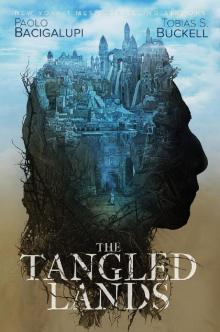 The Tangled Lands
The Tangled Lands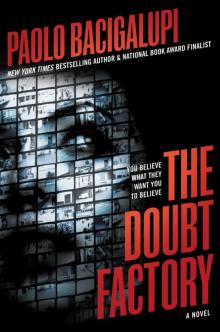 The Doubt Factory
The Doubt Factory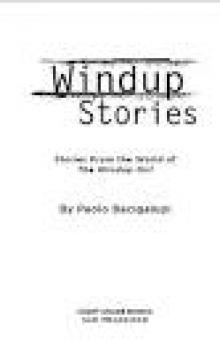 Windup Stories
Windup Stories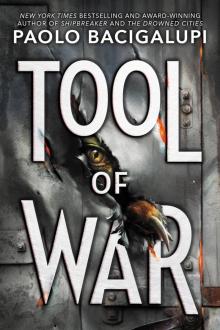 Tool of War
Tool of War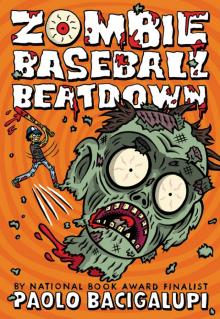 Zombie Baseball Beatdown
Zombie Baseball Beatdown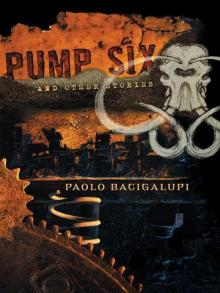 Pump Six and Other Stories
Pump Six and Other Stories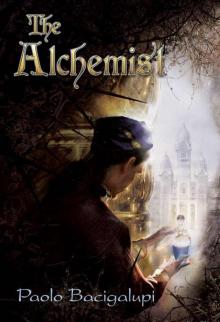 The Alchemist
The Alchemist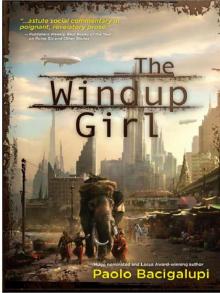 The Windup Girl
The Windup Girl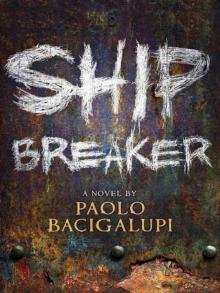 Ship Breaker
Ship Breaker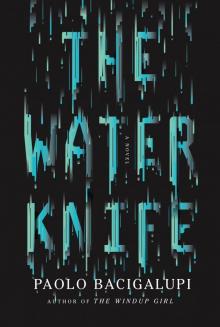 The Water Knife
The Water Knife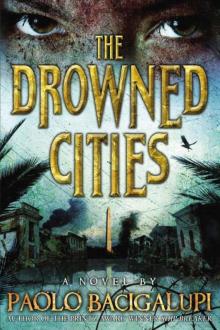 The Drowned Cities sb-2
The Drowned Cities sb-2